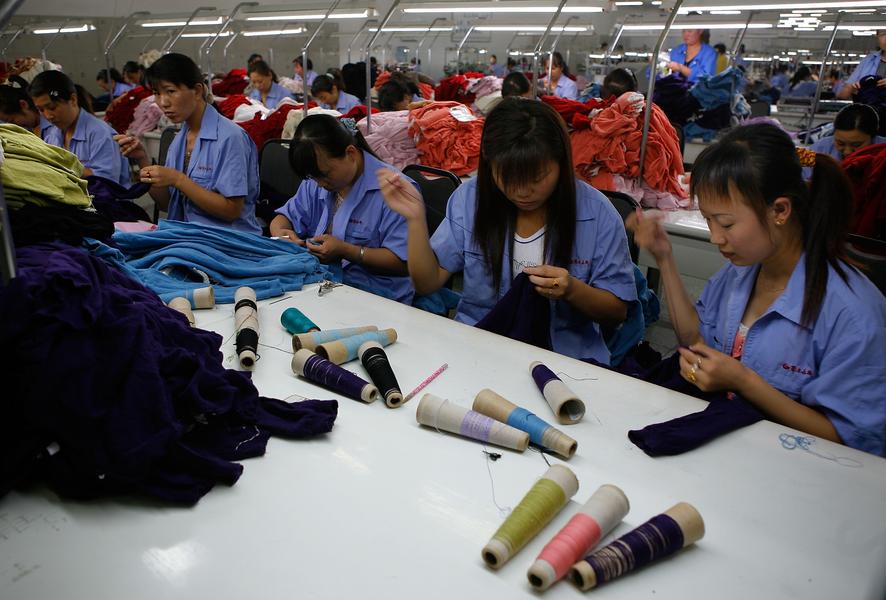China to overtake U.S. as world's largest economy this year
Getty Images

A free daily email with the biggest news stories of the day – and the best features from TheWeek.com
You are now subscribed
Your newsletter sign-up was successful
The U.S. — the world's largest economy since the 1880s — is on the verge of losing its status as the world's largest economy, and is likely to slip behind China this year, says the International Comparison Program, part of the World Bank.
In 2005, the World Bank estimated China's economy was less than half the size of America's, equaling just 43 percent of America's total output. But in 2011 the research placed China's GDP at 87 percent of the U.S., reflecting China's staggeringly enormous economic growth, as well as an updated methodology on purchasing power parity (the amount of goods and services money buys) that recognizes that money goes much further in developing economies than it does in wealthier economies.
With China's economy now expected to have grown 24 percent between 2011 and 2014 while the U.S. is expected to expand only 7.6 percent in that period, China is on course to overtake the U.S. this year. China has already overtaken the U.S. as the world's largest trading nation.
The Week
Escape your echo chamber. Get the facts behind the news, plus analysis from multiple perspectives.

Sign up for The Week's Free Newsletters
From our morning news briefing to a weekly Good News Newsletter, get the best of The Week delivered directly to your inbox.
From our morning news briefing to a weekly Good News Newsletter, get the best of The Week delivered directly to your inbox.
The new measurements dramatically change the shape of the global economic landscape, emphasizing the importance of developing economies. For example, India becomes the world's third-largest economy having previously been in tenth place. The size of its economy also dramatically expanded from the equivalent of 19 percent of the U.S. economy in 2005 to 37 percent in 2011. Russia, Brazil, Indonesia, and Mexico have also grown significantly.
Of course, the U.S. remains vastly ahead of China in terms of economic activity per person. The U.S. has just 4.44 percent of the world's population, while China has 19.1 percent, so it is unsurprising to see China catch the U.S. in terms of total activity. But in terms of economic activity per person, the U.S. is further down the list, in sixth place behind Qatar, Luxembourg, Norway, Singapore, and Brunei.
A free daily email with the biggest news stories of the day – and the best features from TheWeek.com
John Aziz is the economics and business correspondent at TheWeek.com. He is also an associate editor at Pieria.co.uk. Previously his work has appeared on Business Insider, Zero Hedge, and Noahpinion.
-
 Is Andrew’s arrest the end for the monarchy?
Is Andrew’s arrest the end for the monarchy?Today's Big Question The King has distanced the Royal Family from his disgraced brother but a ‘fit of revolutionary disgust’ could still wipe them out
-
 Quiz of The Week: 14 – 20 February
Quiz of The Week: 14 – 20 FebruaryQuiz Have you been paying attention to The Week’s news?
-
 The Week Unwrapped: Do the Freemasons have too much sway in the police force?
The Week Unwrapped: Do the Freemasons have too much sway in the police force?Podcast Plus, what does the growing popularity of prediction markets mean for the future? And why are UK film and TV workers struggling?
-
 TikTok secures deal to remain in US
TikTok secures deal to remain in USSpeed Read ByteDance will form a US version of the popular video-sharing platform
-
 Unemployment rate ticks up amid fall job losses
Unemployment rate ticks up amid fall job lossesSpeed Read Data released by the Commerce Department indicates ‘one of the weakest American labor markets in years’
-
 US mints final penny after 232-year run
US mints final penny after 232-year runSpeed Read Production of the one-cent coin has ended
-
 Warner Bros. explores sale amid Paramount bids
Warner Bros. explores sale amid Paramount bidsSpeed Read The media giant, home to HBO and DC Studios, has received interest from multiple buying parties
-
 Gold tops $4K per ounce, signaling financial unease
Gold tops $4K per ounce, signaling financial uneaseSpeed Read Investors are worried about President Donald Trump’s trade war
-
 Electronic Arts to go private in record $55B deal
Electronic Arts to go private in record $55B dealspeed read The video game giant is behind ‘The Sims’ and ‘Madden NFL’
-
 New York court tosses Trump's $500M fraud fine
New York court tosses Trump's $500M fraud fineSpeed Read A divided appeals court threw out a hefty penalty against President Trump for fraudulently inflating his wealth
-
 Trump said to seek government stake in Intel
Trump said to seek government stake in IntelSpeed Read The president and Intel CEO Lip-Bu Tan reportedly discussed the proposal at a recent meeting